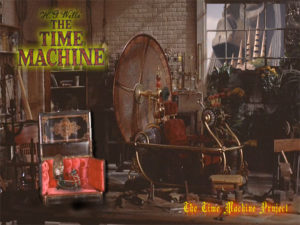About Time
 Back in the early ‘80s, following an encounter with sizzling deep-fry oil, I paid a visit to the emergency room with burns to the face and eyes. (Yeah, I know; fried foods’ll kill ya.) A nurse told me it was the second such case she’d seen that day. In the earlier incident, a toddler had reached for a bowl of hot bacon grease on the kitchen counter while her mother was making breakfast, spilling molten fat it all over her hand and face.
Back in the early ‘80s, following an encounter with sizzling deep-fry oil, I paid a visit to the emergency room with burns to the face and eyes. (Yeah, I know; fried foods’ll kill ya.) A nurse told me it was the second such case she’d seen that day. In the earlier incident, a toddler had reached for a bowl of hot bacon grease on the kitchen counter while her mother was making breakfast, spilling molten fat it all over her hand and face.
I was a young mother myself at the time, and the mental image of that scene as I envisioned it haunted me for long afterward. How that mother must have wished she could go back in time!
I suppose we’ve all wished that at one time or another. The old adage Hindsight is better than foresight is oft repeated because it’s all too true. The problem is, no one’s been able to figure out how to acquire hindsight until it’s too late to use it.
We humans have probably always found the concept of time travel intriguing. I’m not all that familiar with ancient literature, but I’ve read that some of the most world’s most venerable classics suggested the idea long before H. G. Wells  published The Time Machine in 1895.
published The Time Machine in 1895.
The yearning for a do-over is probably one reason for our fascination with time manipulation. Another might be the desire to conquer a powerful force that holds us in its grip.
We’ve made great strides in travel across land, sea, and air; we can communicate instantly with people on the other side of the planet; we’ve even been to the moon. Yet we’re more at the mercy of time than the pre-wheel-era ancients were daunted by distance. They, at least, could travel the land on foot; we can only let time take us where it will at its own inexorable pace.
Is there a wheel of time waiting to be invented? Some would have us believe it already exists.
I recently stumbled on a snippet of a Charlie Chaplain film in which one of the extras in the background appears to be talking on a cell phone. Perhaps you’ve seen the clip. Discussion on the subject abounds, with comments, both serious and snide. If you’re bored, on online search of “time travel proof” can keep you entertained for quite some time.
It’s not hard to dismiss the idea that the woman in the Chaplain film was on a cell phone. Today when we see someone in such a pose, “she’s on the phone” is the first thing that comes to mind. But there are other reasons for a person to put a hand to the side of her head like that. Using a compact ear trumpet makes the most sense to me (perhaps to hear the director’s instructions). But the gesture could have a number of possible interpretations.
 In any event, time is an intriguing thing. Though we know it moves at the same rate consistently, sometimes it weighs heavy on our hands and on other occasions it zips past before we can grab hold of it. The scriptures tell us God has control over time just as he has authority over all his creation. But for some reason, he doesn’t allow do-overs. If he did, wouldn’t he have sent Adam and Eve back to the starting line instead of paying the penalty for their (and our) sin?
In any event, time is an intriguing thing. Though we know it moves at the same rate consistently, sometimes it weighs heavy on our hands and on other occasions it zips past before we can grab hold of it. The scriptures tell us God has control over time just as he has authority over all his creation. But for some reason, he doesn’t allow do-overs. If he did, wouldn’t he have sent Adam and Eve back to the starting line instead of paying the penalty for their (and our) sin?
The Bible is full of stories of repentant people being forgiven by a merciful God. But, eternally forgiven or not, their sins’ earthly consequences always remain. Examples abound: Adam and Eve, as mentioned above; David, in 2 Samuel 11 and 12; and King Manasseh in 2 Chronicles 33:1-20 (along with 2 Kings 23:26-27).
We can speculate all we want about going back in time to correct errors. But it would seem that in reality, our actions and the events those deeds cause remain on the books forever.
I suppose, then, if we’re to benefit from hindsight in a practical way, it must be by learning from the experiences of those who have gone before. More importantly, we might give serious heed to the testimony of the one who is himself the beginning and the ending (Revelation 1:8) and who tells us the end from the beginning (Isaiah 46:10).





























Time travel is always an intriguing idea. Seems do overs would be too tempting if it were possible.
Ironically, though I’ve written few time travel stories, I just wrote one that plays on the points you mention here and posted it on my blog as free fiction last night. Apparently we were picking up the same vibes. lol.
In the end, I’m glad God doesn’t allow going back in time. The world is chaotic enough without people constantly appearing to “fix” things. We wouldn’t know up from down if reality kept changing constantly.
I love time travel stories! Back to the Future is the win.
There’s a video on Youtube about the ten dimensional universe explained. If we could time travel and change time, what you would actually change would be an alternate universe. And you’d jump to that alternate universe and leave your own untouched. No telling how you’d have to get back to your universe. I believe the anime Stein;s Gate deals with time travel and alternate universes.
In my universe the characters have the power to travel through time, but the further you go, the more power it takes and the more draining it is. Mostly people use it to check out peoples’ timelines and the future probabilities. Which is damaging enough, in a Minority Report sort of way.
I don’t think we’ll ever unlock the true secret of time travel, but quantum science being what it is, who knows? In Frequency he gets to send messages back in time and change the past, and inadvertently sends a serial killer on the rampage. There’s always repercussions.
Do overs are about succeeding. But God understands and has reacted to the fact that WE CANNOT SUCCEED. Success is not God’s intention for us. Forgiveness, restoration and living TOWARD resurrection are.
One day I am going to write a novel around the following concept of time. If you write one first please let me know how it goes!
Time: I am a fluid spread on a slice of NOW. I ooze my way from one slice to the next, they are stacked like dominoes. I am sticky. I leave traces behind me and diminish in size (volume) but I also pick up residue from what I meet on each NOW. Other people’s souls are also oozing across and when our NOWs coincide we mingle and leave with some of each other. Souls are the connections between NOWs. Souls of people, of places, of animals and objects. NOWs happen when there is no earthly being because there is an Ultimate Soul, a triune personality that experiences all NOWs simultaneously. There is an enemy that tries to destroy all connectivity. The Ultimate Soul sacrificed Himself to draw all disconnectivity to an end – accepted the ultimate disconnectivity in order to restore me to His NOW. One NOW follows another until I reach a transition. My connectivity increases so much that I don’t ooze anymore across the NOWs.
A great time travel story is Robert Young’s The Dandelion Girl. It’s a shame it’s not well known. It has a great twist, and it’s a big subversion of the do-over idea. Also a crowning moment of heartwarming, too.
Thank you, dmdutcher! I am blessed to read this story.
No time travel discussion would be complete without this quote:
“People assume that time is a strict progression of cause to effect, but actually — from a non-linear, non-subjective viewpoint — it’s more like a big ball of wibbly-wobbly… timey-wimey… stuff.”
–Tenth Doctor